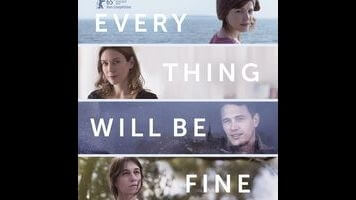Tomas Eldan, the Canadian novelist played by James Franco in Wim Wenders’ lame 3-D melodrama Every Thing Will Be Fine, always looks like he’s ready to zonk out for a nap. As a matter of fact, he’s introduced waking up from one, in an ice shack that doubles as his writing room, and he moves through every subsequent scene as though he were searching for a light switch on the way to the bathroom. Is it too perfect that when the movie finally perks up, which is in its last 20 or so minutes, it’s in a scene where Tomas drinks a cup of coffee? Or that its muffled climax has him discovering that an intruder has pissed all over his bed? Every Thing Will Be Fine, ostensibly about a writer who realizes his dreams on the back of someone else’s nightmare, resembles nothing more than the story of one man’s decade-long quest to get some quality zzzzs. It probably couldn’t ask for a more fitting star than Franco, who has eyes like the headlamps of a beat-up old Corvette Stingray, stuck halfway between open and closed.
Set in Quebec, Every Thing Will Be Fine starts with an accident, in which Tomas’ wood-paneled Jeep Wagoneer strikes and kills a toddler on a snowy rural road. In the years that follow, he goes through the usual stages of burnout protagonism (including the most important one: holing up in a motel room full of empty liquor bottles), eventually emerging as the acclaimed author of This Is A Room and assorted other books whose titles and covers resemble the lit-fic parodies from Listen Up Philip. Finally, just as Tomas has settled into a cozy life with a family of his own in, yes, a glass house, the now-teenage brother of the boy shows up to collect what’s due, accusing him of using a tragedy in which he played a brief but pivotal role for a bookshelf’s worth of creative inspiration, pinpointing how even seemingly innocuous passages in Tomas’ fiction trace back to that fateful evening. At this point, a reader might think that all of this sounds like a decent set-up for, say, an arthouse suspense flick about bourgeois mores, à la Michael Haneke. It is, but Every Thing Will Be Fine isn’t that film.
For one, it takes almost the entire movie to introduce a lone demitasse of dramatic tension (i.e., the set-up described in the above paragraph), and then, it more or less spits it out on the floor. Every Thing Will Be Fine is a critic’s worst nightmare, which is to say that it’s really goddamn boring—the kind of boring that is tough to write about, and which inevitably threatens to bring out everyone’s inner hack, cycling through synonyms to keep the prose lively (“dull,” “tedious,” “stultifying,” etc.), all the while fighting the urge to just start nitpicking things that might be endearing in a better film. (Sure, no two members of the cast here have the same accent, but neither does anyone in The Scarlet Empress.) Why? Wenders (Paris, Texas; Wings Of Desire) used to be one of the hippest and most cosmopolitan filmmakers around, a director of road trips and existential metaphors that twirled out into long passages of poetic observation. But somewhere around the 1990s, his fiction films started to get soft and fat, distended by cameos and travel-guide backdrops—the kind of stuff that had spun his best films, but now lacked a motor of ambition.
So perhaps Every Thing Will Be Fine is supposed to be the director’s back-to-basics movie, putting him in the mode of the ’50s Hollywood dramas (see: Alexandre Desplat’s throwback score) that haunted his early German films like dreams—and maybe Wenders has just depleted whatever basics he could go back to. There are exactly two interesting things about Every Thing Will Be Fine. The first is the use of 3-D as a stand-in for the rapturous use of color in classic melodramas; it works for the first 10 or so minutes, which are set in the dead of winter. Then the viewer realizes that all of the ideas Wenders has cooked up for 3-D involve falling snow, and that the rest of the movie is set in the spring, summer, and fall seasons of an 11-year period, and mostly consists of awkwardly staged conversations with a 2-to-1 ratio of heavy pauses to actual dialogue, occasionally spruced up with a reflection or a barely motivated Vertigo-style dolly-zoom.
The second interesting thing about Every Thing Will Be Fine is that it’s very bad, and that its bizarre throwaway lines and shrugged-off subplots brings to mind Tommy Wiseau instead of Douglas Sirk—an impression underscored by extensive, largely mismatched dubbing. Years are skipped in random ellipses, as though the movie were arbitrarily popping in to check in on whatever’s been happening (spoiler: nothing) in Bjørn Olaf Johannessen’s bogus script. Charlotte Gainsbourg, Marie-Josée Croze, and Rachel McAdams come and go in thankless roles that call for the actresses to sustain peeved expressions for as long as possible. These women are the disappointed chorus for Tomas’ life story, considered characters only because they have names. In a way, they are stand-ins for the audience.

